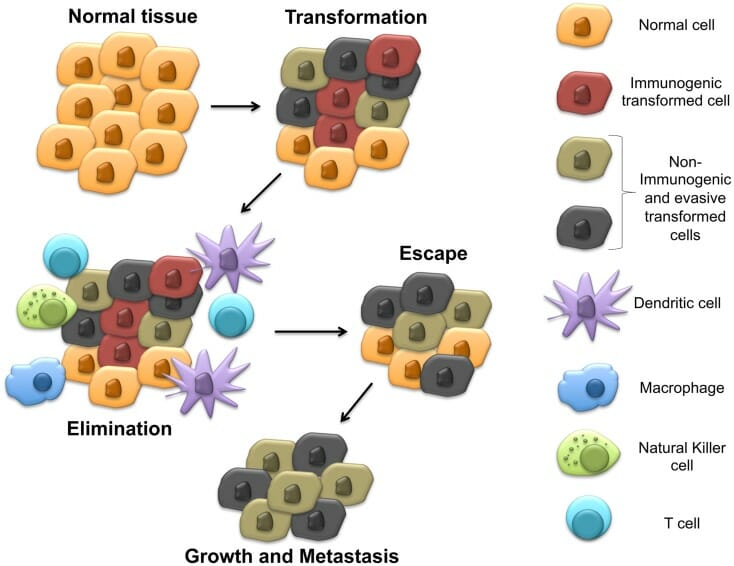Playlist
Show Playlist
Hide Playlist
Tumor-Infiltrating NK Cells
-
Slides Tumor Immunology.pdf
-
Reference List Immune System.pdf
-
Download Lecture Overview
00:01 Natural killer cells were originally identified by their ability to kill tumor cells. 00:09 We now know that there are tumor-infiltrating natural killer cells that enter into tumors, where they can potentially recognize and eliminate malignant cells. 00:19 They respond to stress or abnormal cells. 00:24 And the balance of the activating and inhibitory receptors determines the outcome of an encounter with a natural killer cell. So natural killer cells have on their cell surface a mixture of activating and inhibitory receptors. They’ll have several activating receptors and several inhibitory receptors. The inhibitory receptors recognize MHC Class I which is present on the cell surface of all normal cells. The activating receptors recognize a number of different molecules that are also normally present on all normal cells. 01:08 The activating receptors send signals into the cell, and so do the inhibitory receptors. 01:20 Tumors for a variety of reasons often stop expressing MHC Class I. 01:28 And because this is a molecule that is normally present on all nucleated cells, the natural killer cells have learnt to recognize the absence of MHC Class I which we often refer to as missing self. 01:42 These NK cells can recognize that as being a marker that something weird is going on, something abnormal is going on with this cell, perhaps it’s a tumor cell. 01:53 And there is a lack of stimulation through the inhibitory receptors, because they recognize Class I. 01:59 If there’s no Class I, there can’t be any stimulation through the inhibitory receptors. 02:02 And the major response is through activating receptors such as NKG2D, NKp30 and NKp46 which activate the NK cell to kill the tumor cell through the release of perforin and granzymes or through death receptor pathways. 02:24 However, some tumor cells will maintain expression of MHC Class I but up-regulate the ligands for the activating receptors. 02:34 So although there is still an inhibitory signal going into the NK cell, there is a much more powerful signal coming from the activating receptors which overrides the inhibitory signal. 02:47 And therefore again, the natural killer cell can kill the tumor cell. 02:52 While NK cells recognize tumors through these innate mechanisms, T cells use a different approach. T cells recognize tumors using their T cell receptors that bind to specific peptide-MHC complexes. 03:08 Most tumor cells have around 60 or more mutations, and each patient has a unique set of mutations. 03:16 For cytotoxic T-cell recognition of mutated antigens, the relevant proteins must be processed by the proteasome, and peptides containing the mutated amino acid sequences must bind to the patient's MHC Class I molecules. 03:35 The immune system can potentially use a variety of mechanisms, including antibodies, NK cells and cytotoxic T cells, to destroy tumor cells. 03:46 Nonetheless, approximately 50% of people develop cancer at some point in their life. 03:53 So given all these potential ways in which the immune system can fight tumor cells, why is it that tumors do not succumb to the immune response? Well, tumors share most antigens with the normal cell type from which they arose. 04:13 And therefore the lymphocytes are tolerant. 04:17 They also exhibit a Darwinian selection of tumor antigen loss mutants. 04:22 So the immune system may recognize something, may start to attack this abnormal protein on the surface of the tumor cell. 04:29 But remember, tumor cells are dividing, dividing, dividing incredibly rapidly. 04:34 It just requires one cell to lose expression of that tumor antigen. 04:39 And that will have a selective advantage because the immune system can no longer recognize it, and it will become the dominant clone. 04:45 They may fail to produce damage-associated molecular patterns (DAMPs) needed to activate the immune system. They can have reduced expression of MHC molecules through multiple mechanisms including structural mutations and epigenetic silencing. 05:04 Note that whilst reduced expression of MHC class I may make the tumor cells more susceptible to attack by natural killer cells, they will become less susceptible to attack by cytotoxic T cells. 05:18 In some cases the net effect may be a reduced overall response favoring tumor cell survival. 05:27 Additionally, tumors can create an immunosuppressive microenvironment through factors like hypoxia and immunosuppressive cytokines. 05:36 A number of pathogens that induce tumors actually interfere with antigen processing and presentation pathways. 05:44 The Epstein-Barr virus is an excellent example here. 05:47 Tumors have low levels of co-stimulatory molecules for example, the B7 molecules. 05:52 And therefore induce T-cell anergy. 05:54 They can upregulate the expression of the anti-apoptotic gene Bcl-2 to resist killing by cytotoxic T lymphocytes. And as already mentioned they can produce immunosuppressive molecules, for example transforming growth factor beta, vascular endothelial growth factor, and indolamine-2,3-dioxygenase or IDO. 06:19 In recent years, NK cell-based immunotherapies have shown promise in cancer treatment. 06:26 These include adoptive transfer of ex vivo activated NK cells, CAR-NK cells, and various approaches to block inhibitory receptors or enhance activating signals. 06:43 Understanding the biology of tumor-infiltrating NK cells is important for developing these new therapeutic strategies.
About the Lecture
The lecture Tumor-Infiltrating NK Cells by Peter Delves, PhD is from the course Tumor Immunology. It contains the following chapters:
- Tumor-Infiltrating NK Cells
- Why Do Tumors not Succumb to the Immune Response?
Included Quiz Questions
According to the 'missing self' hypothesis, one function of natural killer cells is to recognize and eliminate cells that fail to express which of the following molecules?
- Major histocompatibility complex class I
- Major histocompatibility complex class II
- Cluster of differentiation 4
- Cluster of differentiation 8
- Cluster of differentiation 5
What is the primary role of inhibitory receptors on natural killer (NK) cells?
- Inhibiting NK cells from attacking normal cells
- Inhibiting NK cells from attacking tumor cells
- Inhibiting normal cells from becoming tumor cells
- Inhibiting tumor cells from proliferation
- Recognizing which tumor cells to attack
Which of the following immunological changes by tumor cells is MOST LIKELY to make them resistant against the host immune response?
- Failure to produce damage-associated molecular patterns
- Increased expression of MHC molecules
- Reduction of T-cell anergy
- Down regulation of Bcl2
- Preventing the production of transforming growth factor beta
Customer reviews
5,0 of 5 stars
| 5 Stars |
|
5 |
| 4 Stars |
|
0 |
| 3 Stars |
|
0 |
| 2 Stars |
|
0 |
| 1 Star |
|
0 |




